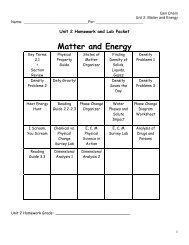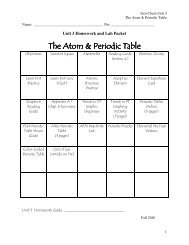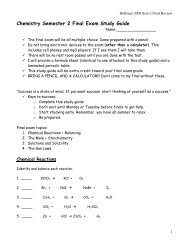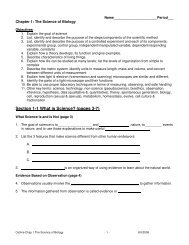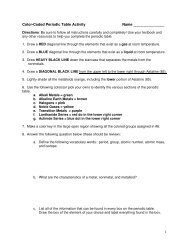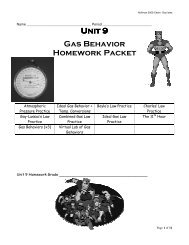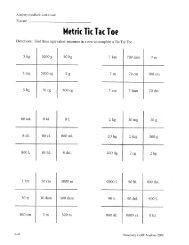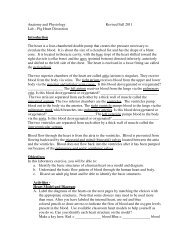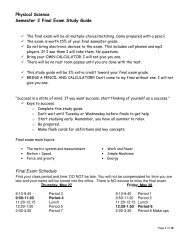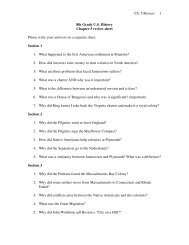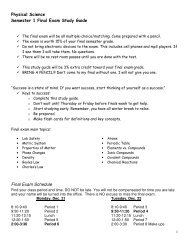The Industrial Revolution: The Human Side
The Industrial Revolution: The Human Side
The Industrial Revolution: The Human Side
You also want an ePaper? Increase the reach of your titles
YUMPU automatically turns print PDFs into web optimized ePapers that Google loves.
Advanced Placement European History. Book 1Lesson 27Handout 45 (page 1)NameDate<strong>The</strong> <strong>Industrial</strong> <strong>Revolution</strong>: <strong>The</strong> <strong>Human</strong> <strong>Side</strong>__Directions: Read the selections for the identity assigned to your group: factory workers. factoryowners. or economists. Prepare a point of view on the <strong>Industrial</strong> <strong>Revolution</strong> for your group topresent to an objective historian. In your presentation. include the main thrust of the argumentyou would like to have presented in a history of the <strong>Industrial</strong> <strong>Revolution</strong> and providethree points of evidence to support this position. <strong>The</strong>n write two questions. one for each of theopposing opinions. that would force them to admit the validity of your position.FactoryWorkersTestimony of Peter Gaskell. Coal MinerWhen asked. Do you prefer women to boys as drawers. Peter Gaskell.a collier at Mr. Lancaster's, near Worsley. Lancs. replied: Yes. they arebetter to manage. and keep the time better; they will fight and shriek anddo every thing but let anybody pass them. and they never get to be coalgetters.that is another good thing.-Parliamentary Papers. 1842Drinking Establishments Capitalize on the Worker, <strong>The</strong>y [saloons] are open at the· earliest hour. when the shiveringartisan is proceeding to his work. holding out to him a temptation utterlyirresistible-and remain open during a considerable portion of the nightministering their poisons to thousands of debilitated creatures ....- <strong>The</strong> Manufacturing Population of England. 1833Testimony of Betty Harris, Coal MinerI have a belt round my waist. and a chain passing between my legs.and I go on my hands and feet. <strong>The</strong> road is very steep. and we have tohold by a rope; and when there is no rope, by anything we can catch holdof. <strong>The</strong>re are six women and about six boys and girls in the pit I work in;it is very hard work for a woman. <strong>The</strong> pit is very wet where I work. andthe water comes over our clog-tops always, and r have seen it up to mythighs; it rains in at the roof terribly. My clothes are wet through almostall day long. I never was ill in my life. but when r was lying in.-Parliamentary Papers. 1842Report on the Sanitary Condition of the Labouring Population<strong>The</strong> accidents which occur to the manufacturing population of Birminghamare very severe and numerous. as shown by the registers of theGeneral Hospital. Many are the consequences of the want of proper attentionto the fencing of machinery, which appears to be seldom thoughtof in the manufactories; and many are caused by loose portions of dressbeing caught by the machinery. so as to drag the unfortunate sufferersunder its power. <strong>The</strong> shawls of the females. or their long hair. and theaprons and loose sleeves of the boys and men. are in this way frequentcauses of dreadful mutilation.-Parliamentary Papers, 1842I© COPYRIGHT,<strong>The</strong> Center for Learning. Used with permission. Not for resale.189
Advanced Placement European History. Book 1Lesson 27Handout 45 (page 2)NameDate -----------_Report on Infant Lace-Workers<strong>The</strong> children of this family, and the mother, who reside in WalkerStreet. New Sneinton, give the following evidence: Mary Houghton, fouryears old. wHas drawn lace two years; her mother gives her a penny aweek.w Anne Houghton, six years old: WHasbeen a drawer three years.wMrs. Houghton, the mother of these children: wls a lace-drawer and hasfour children: Harriet 8 years. Anne 6, Mary 4, and Eliza 2 years old; ofthese the three elder are employed as lace drawers. Harriet was not quitethree when she began to work. Anne was about the same. and Mary wasnot quite two years old." wEliza has drawn a few threads out.wAll this (says the Sub-Commissioner) was interrupted with, wMindyour work," "Take care," "Make haste," "Now, Anne, get on," "Mind yourwork."Begins generally at 6 A.M. in the summer and 7 A.M. in the winter; inthe former goes on till dark, in the latter till 10 P.M •.•.-Parliamentary Papers, 1842<strong>The</strong> Value of SonsFamilies of boys are, amongst pit-people, valuable property, on accountof their earnings in the pits. A widow with a family of boys is considereda catc/L I was told that such a widow was accosted by a suitor even ather husband's grave. Her reply was, "You are too late: I am engaged. Iaccepted B- before starting for the funeral!"-OurCoal Fields and Our Coal Pits, n.d.Testimony of Abraham Whitehead. ClothierHow early do you think that they leave their homes?-I can tell you whata neighbour told me six weeks ago; she is the wife of Jonas Barrowcliffe,near Scholes; her child works at a mill nearly two miles from home, andI have seen that child coming from its work this winter between 10 and11 in the evening; and the mother told me that one morning this winterthe child had been up by 2 o'clock in the morning ....-Parliamentary Papers, 1831-32Flogging of ChildrenMark Best. flax-mills overlooker, was asked to describe "the sort ofstraps that are made use of' to keep the children at work:<strong>The</strong>y are about a foot and a half long, and there is a stick at the end;and that end they beat them with is cut in the direction of my fingers, thus. having five or six thongs, some of them. Some of them are set in ahandle, some are not.-Parliamentary Papers, 1831-32ISource: "Hard Times": <strong>Human</strong> Documents of the <strong>Industrial</strong> <strong>Revolution</strong>, E. Royston Pike (New York: Frederick A. Praeger,1966), 51-259 passim.© COPYRIGHT,<strong>The</strong> Center for Learning ..Used with permission. Not for resale.190
Advanced Placement European History, Book 1Lesson 27Handout 45 (page 3)NameDate<strong>The</strong> <strong>Industrial</strong> <strong>Revolution</strong>: <strong>The</strong> <strong>Human</strong> <strong>Side</strong>__Directions: Read the selections for the identity assigned to your group: factory workers, factoryowners, or economists. Prepare a point of view on the <strong>Industrial</strong> <strong>Revolution</strong> for your group topresent to an objective historian. In your presentation, include the main thrust of the argumentyou would like to have presented in a history of the <strong>Industrial</strong> <strong>Revolution</strong> and providethree points of evidence to support this position. <strong>The</strong>n write two questions, one for each of theopposing opinions, that would force them to admit the validity of your position.FactoryOwnersTestimony of Archibald Buchanan, Manager of Cotton MillsWhat number of persons are employed in the different works?-I canonly speak to the works under my own particular management. At theCatrine works there are 875 persons employed, of whom 22 males and37 females are under ten years of age. I suppose the youngest may be 8or 9; we have no wish to employ them under ten years of age.What are your hours of work?-Our working hours are twelve hoursin the day. <strong>The</strong>y begin at 6 o'clock in the morning. they stop at half-pastseven at night, and they are allowed half an hour to breakfast, and anhour to dinner.You have not observed that the twelve hours work has interfered withthe health of the children?-I have not. . . . I have seen many instancesof children that were taken in the works as young as six, whose healthdid not appear at all to suffer; on the contrary, when they got to greatermaturity, they appeared as healthy stout people as any in the country.<strong>The</strong>y go to all trades, masons and joiners, and weavers, and so on.Are they as tall?-Yes, I do not see any difference.Do you conceive that the habits of regularity they are taught in theworks, are advantageous to them in their pursuits afterwards?-I shouldthink it was; that is the chief advantage tradesmen think they have inemploying children from the factories.That is, from their habits of industry?-Yes, and the ingenuity theyacquire in the works.Are the parents generally very desirous to send their children to you,or not?-Very desirous.What are the weekly wages a child of nine years old, will acquire inyour works?-<strong>The</strong> children of 9 years are generally learners, and receive Is[shilling) 6d [pence) to 2s [shillings) per week, according to their ability.In what manner are the children educated in your works?-We havethree schools at present, I think, in the village: one of the schoolmasterswe give a house to, with fire and candle, and £30 a year as a salary; heteaches one hour after the works stop on week days, and on Sundays heattendsattend.the Sunday schools; but I do not recollect the time the childrenYou make the children's confinement fourteen hours, then?-<strong>The</strong>y arenot compelled to go to school in the evening.-ParLiamentary Papers, 1816© COPYRIGHT.<strong>The</strong> Center for Learning. Used with permission. Not for resale.191
Advanced Placement European History, Book 1Lesson 27Handout 45 (page 5)NameDate<strong>The</strong> <strong>Industrial</strong> <strong>Revolution</strong>: <strong>The</strong> <strong>Human</strong> <strong>Side</strong>__Directions: Read the selections for the identity assigned to your group: factory workers, factoryowners, or economists. Prepare a point of view on the <strong>Industrial</strong> <strong>Revolution</strong> for your group topresent to an objective historian. In your presentation, include the main thrust of the argumentyou would like to have presented in a history of the <strong>Industrial</strong> <strong>Revolution</strong> and providethree points of evidence to support this position. <strong>The</strong>n write two questions, one for each of theopposing opinions, that would force them to admit the validity of your position.EconomistsDavid Ricardo: On WagesLabour, like all other things which are purchased and sold, and whichmay be increased or diminished in quantity, has its natural and its marketprice. <strong>The</strong> natural price of labour is that price which is necessary toenable the labourers, one with another, to subsist and perpetuate theirrace, without either increase or diminution.<strong>The</strong> power of the labourer to support himself, and the family whichmay be necessary to keep up the number of labourers, does not depend onthe quantity of money which he may receive for wages, but on the qualityof food, necessaries, and conveniences [that.] become essent.ial to himfrom habit, which that money will purchase. <strong>The</strong> natural price of labour,therefore, depends on the price of the food, necessaries, and conveniencesrequired for the support of the labourer and his family. With a rise in theprice of food and necessaries, t.he natural price of labour will rise; withthe fall in their price, the natural price of labour will fall.With the progress of society the natural price of labour has always at.endency to rise, because one of the principal commodities by which itsnatural price is regulated, has a tendency to become dearer, from t.he greaterdifficulty of producing it. As, however, the improvements in agriculture,the discovery of new markets, whence provisions may be imported, mayfor a time counteract the tendency to a rise in the price of necessaries,and may even occasion their nat.ural price to fall, so will the same causesproduce the correspondent effects on the natural price of labour. . . .<strong>The</strong> market price of labour is the price which is really paid for it, fromthe natural operation of the proportion of the supply to the demand; labouris dear when it is scarce, and cheap when it is plentiful. However muchof the market price of labour may deviate from its natural plice, it has,like commodities, a tendency to conform to it.It is when the market price of labour exceeds its natural price, thatthe condition of the labourer is nourishing and happy, that he has it inhis power to command a greater proportion of the necessaries and _enjoymentsof life, and therefore to rear a healthy and numerous family. When,however, by the encouragement which high wages give to the increase ofpopulation, the number of labourers is increased, wages again fall to theirnatural price, and indeed from a reaction sometimes fall below it.When the market price of labour is below its natural price, the conditionof the labourers is most wretched; then poverty deprive~ them ofthose comforts which custom renders absolute necessaries. It is only aftertheir privations have reduced their number, or the demand for labour hasincreased, that the market price of labour will rise to its natural price,and that the labourer will have the moderate comforts which the naturalrate of wages will afford.''David Ricardo, Principles of Political Economy and Taxation, in Economic Doctrines, Frank AmandusMcGuin Publishers, 1946), 147-48.© COPYRIGHT,<strong>The</strong> Center for Learning. Used with permission. Not for resale.193Neff (Wichita. Kans.:
Advanced Placement European History, Book 1Lesson 27Handout 45 (page 6)Name-----------Date ------------Thomans Malthus: <strong>The</strong> Principle of Population[Thomas] Malthus proceeded to lay down his famousprinciple:. that the power of population is indefinitely greater thanthe power in the earth to produce subsistence for man. Population,when unchecked, increases in a geometrical ratio. Subsistenceincreases only in an arithmetical ratio. A slight acquaintance withnumbers will show the immensity of the first power in comparisonto the second.Elaborating the proposition further, Malthus buttressed his case in thisway:Through the animal and vegetable kingdoms, nature has scatteredthe seeds of life abroad with the most profuse and liberalhand. She has been comparatively sparing in the room, and thenourishment necessary to rear them. . . . <strong>The</strong> race of plants,and race of animals shrink under this great restrictive law. Andthe race of man cannot, by any efforts of reason, escape from it.Among plants and animals its effects are waste of seed, sickness,and premature death. Among mankind, misery and vice.<strong>The</strong>se hard but realistic facts, in Malthus' estimation, placed insurmountabledifficulties in the way of the perfectibility of society. No possiblereform could remove the pressure of natural laws, obstacles which preventthe "existence of a society, all the members of which, should live in ease,happiness,the meansand comparative leisure; and feel no anxiety aboutof subsistence for themselves and families." . . .providingCertain inevitable practical conclusions followed, in Malthus' view. Ifhuman beings were to enjoy the greatest possible happiness, they shouldnot assume family obligations unless they could afford them. Those withoutadequate means to support a family should remain celibate. Furthermore,public policy, such as the poor laws, should avoid encouraging the laboringclass and others to bring into the world children whom they could notsupport.A man who is born into a world already possessed, if he cannotget subsistence from his parents, on whom he has a just demand,and if the society do not want his labour, has no claim of right tothe smallest portion of food, and, in fact, has no business to bewhere he is.2.)'Robert B. Downs, Books That Changed the World (New York: Mentor, 1983), 246-47.© COPYRlGHT,<strong>The</strong> Center for Learning. Used with permission. Not for resale.194



